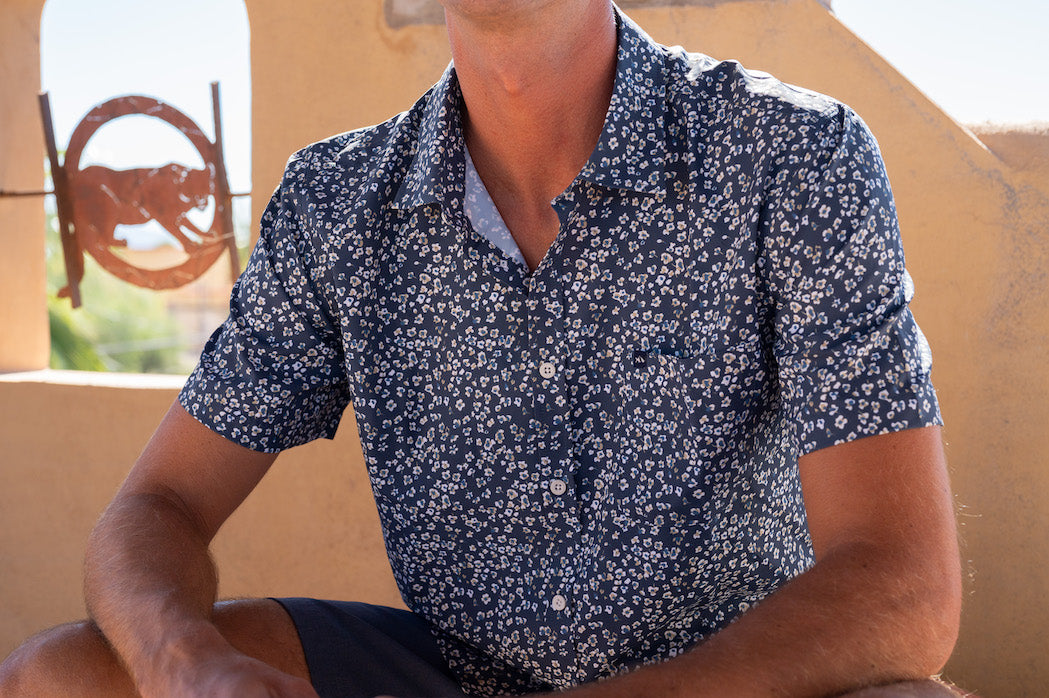If you’re in search of the perfect top that’s both casual and dressy, look no further than the comfortable, clean-lined sport shirt. Longtime staples of your father’s wardrobe, sport shirts have become more versatile tops for this generation, as they’re fitting attire for the clubhouse, the marina, and even the office. But there’s more to sport shirts than meets the eye. Let’s dive into the history of this classic garment and look at how you can shake up your wardrobe with the addition of just one or two sport shirts.
What Is a Sport Shirt?
Sport shirts are informal, long- or short-sleeved, collared, button-down shirts that have a squared-off hem on the bottom, allowing the shirt to be worn untucked. The term “sport” should not be confused with the plural form, sports, which would indicate a shirt worn specifically for team sports activities, like a jersey. But the sport shirt design, with its untucked, straight hem, likely originated from early sports uniforms and use in hunting (or “sporting”) activites.
Fabrics have little to do with a shirt’s classification as a sport shirt. Though sport shirts are most commonly designed with a cotton or cotton-blend material, they can be made of synthetic fibers or a variety of other natural fibers like hemp or wool. One of the most common characteristics of fabrics used in sport shirts is their thinness, which allows for a more fitted finish. So a warm, heavyweight flannel shirt would likely not be considered a sport shirt, but a thin flannel, and lightweight plaid button-downs, would.
What Is Considered a Sport Shirt?
Any informal, collared, button-down shirt can be considered a sport shirt. Whether the shirt is a solid color or includes playful designs, if it has a collar, button placket, and a straight hem, it technically qualifies as a sport shirt. One more qualifier of a sport shirt is its fitted cut, so while a classic Hawaiian shirt checks many of the boxes of a sport shirt, its fit is too baggy for it to be considered a true sport shirt.
What Is the Difference Between a Sport Shirt and a Dress Shirt?
Some of the main differences between sport shirts and dress shirts:
- Sport shirts feature bolder patterns than dress shirts.
- Sport shirts are designed to be worn without a tie, so the collars are often spread wider than a dress shirt’s collar and do not have button closures on the collar points.
- Dress shirts are more commonly designed with a rounded hem, which keeps the shirt tucked in, while sport shirts have a straight hem designed to wear untucked.
- Sport shirts commonly have one or two pockets, while dress shirts usually have one or no pockets.
- Dress shirts are sized using neck and sleeve length measurements, while sport shirts commonly come in small, medium, large, or extra large.
Are Sport Shirts Business Casual?
Sport shirts are a staple of business casual attire. You’ll find sport shirts worn daily in pretty much every business-casual office in the U.S. They’re as ubiquitous as solid-colored polo shirts when it comes to informal office wear. While the casual dress code can be a grey area in many offices, sport shirts are universally welcome business-casual attire.
How To Wear a Sport Shirt
The most reliable and timeless look for a sport shirt is paired with business casual five-pocket pants or chinos. Designed to be worn untucked, sport shirts create even lines with their straight hems, which makes for a handsome style when paired with plain-front pants and a braided belt.
But sport shirts aren’t only for business-casual wear; they’re versatile tops that work perfectly for a relaxed weekend look. If you’re headed out on the boat or to a barbecue, pair your favorite sport shirt with chino shorts for a clean, casual outfit that’s also super comfortable on warmer days.
Can You Wear Sport Shirts with Jeans?
Jeans are the perfect casual accompaniment for sport shirts, especially if you want an untucked presentation with your denim. To coordinate an outfit, you’ll want your jeans to match your shirt. Choosing a darker blue or a tan denim gives you more choices when pairing your jeans with your sport shirt.
It’s hard to put it more plainly than this: Sport shirts work for everyone. It’s likely you already have a few sport shirts hanging in your closet. But if you don’t, make sure to pick up one or two next time you’re shopping, or add some to your wishlist for your birthday or an upcoming holiday. Short- or long-sleeved, sport shirts can go everywhere, from the office to the skiff, and they can certainly keep you comfortable and looking great as you drift off course.




